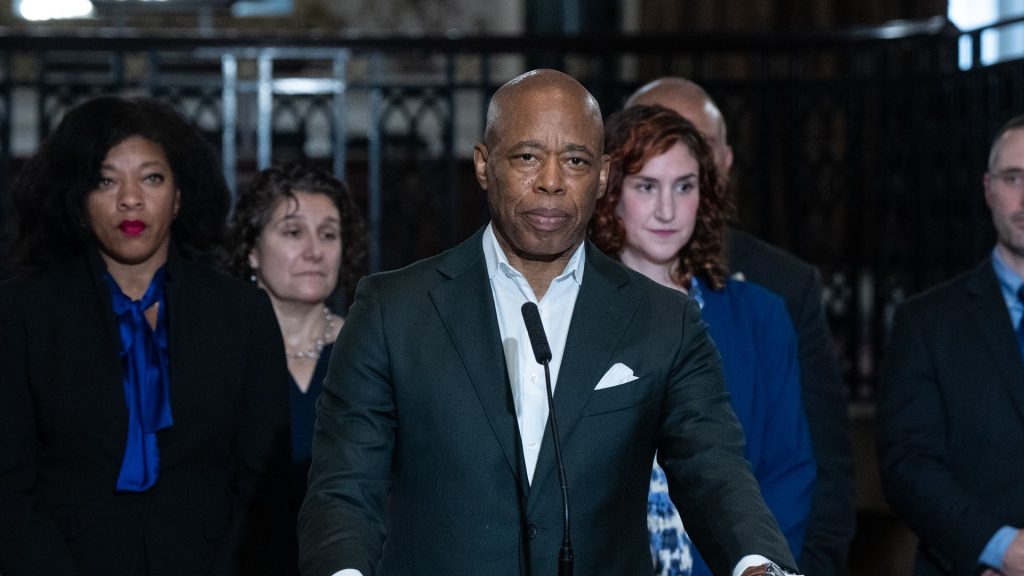Trump administration sues New York City over sanctuary laws

The Department of Justice (DOJ) sued New York City on Thursday, July 24, over its “sanctuary” policies, as part of a prolonged effort to clamp down on jurisdictions that protect undocumented immigrants from federal detainments. The move comes just days after the city of Louisville, Kentucky, agreed to honor the U.S. Immigration and Customs Enforcement detainers in exchange for the removal of its “sanctuary city” designation by the Trump administration.
Bondi issues statement
“New York City has released thousands of criminals on the streets to commit violent crimes against law-abiding citizens due to sanctuary city policies,” Attorney General Pam Bondi said in a statement. “If New York won’t stand up for the safety of its citizens, we will.”
The Trump administration’s legal action comes after it warned Louisville that it would sue the city if it did not comply with 48-hour ICE detainers, allowing agents to take immigrants living in the country illegally into custody. Democratic Mayor Craig Greenberg said he will comply with the detainers, noting that failing to do so could result in the city losing hundreds of millions of dollars in federal funds and subject it to mass ICE raids.
The DOJ accuses New York’s sanctuary laws of being a barrier to the administration’s efforts to enforce immigration law and argues it violates the Supremacy Clause of the U.S. Constitution.
“New York City has long been at the vanguard of interfering with enforcing the country’s immigration laws. Its history as a sanctuary city dates back to 1989, and its efforts to thwart federal immigration enforcement have only intensified,” the complaint said.
What the lawsuit seeks
In the lawsuit, the Trump administration requests the Eastern District Court of New York rule that the city’s laws violate the Supremacy Clause. As a result, this makes the city’s rules invalid. The DOJ has also asked the court to permanently ban the city’s departments and officials from carrying out sanctuary city policies.
Mayor Eric Adams, who has offered to help the Trump administration with removing violent immigrants from New York City and to roll back some sanctuary policies, said he “will review the lawsuit” in a statement on X.
“We support the essence of the local laws put in place by the City Council — but I have also been clear that they go too far when it comes to dealing with those violent criminals on our streets and have urged the Council to reexamine them to ensure we can effectively work with the federal government to make our city safer,” Adams wrote. “So far, the Council has refused.”
A spokesperson for the city council released a statement acknowledging that the city’s law department was reviewing the suit while denying the administration’s accusations.
“Pam Bondi may want to distract from reality, but the facts are clear: the evidence consistently shows that cities with sanctuary laws are safer than those without them,” the statement read. “When residents feel comfortable reporting crime and cooperating with local law enforcement, we are all safer, something both Republican and Democratic mayors of New York City have recognized. It is the Trump administration indiscriminately targeting people at civil court hearings, detaining high schoolers, and separating families that make our city and nation less safe.”
Homan’s criticism
“Border czar” Tom Homan has recently ramped up his criticism of New York, calling it “the biggest sanctuary city in this country.” His remarks came after an off-duty Customs and Border Protection agent was shot in the city. Trump administration officials have blamed the shooting in part on the city’s sanctuary laws. Authorities have taken a person of interest into custody and report the shooting appears to be an attempted robbery that does not seem to be linked to the victim’s work.
President Donald Trump has also warned he’ll withhold federal money from sanctuary communities and take legal action against state and local officials who get in the way of federal immigration enforcement.
Trump signed an executive order shortly after taking office that called on Department of Homeland Security Director Kristi Noem and Bondi to see that sanctuary jurisdictions “do not receive access to federal funds” and determine potential criminal or civil punishment for municipalities that “interfere with the enforcement of Federal law.”
In April, a federal judge blocked the order’s suspension of federal funds to sanctuary communities, ruling it violated the Constitution’s separation of powers standards. The same judge issued an injunction against a similar effort by Trump in 2017.
Other legal actions
The administration has also taken legal action against states and major cities over sanctuary laws, including Los Angeles. The White House argues that they present a barrier and discriminate against federal agents by failing to treat them like other law enforcement agents in California by blocking access to property and detainees. In the lawsuit, the Trump administration blames the laws for clashes between federal immigration agents and demonstrators in LA in June.





